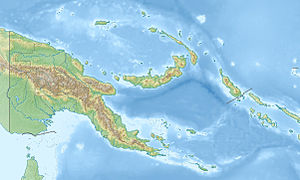Buka
| Buka | ||
|---|---|---|
| Buka and Bougainville | ||
| Waters | Pacific Ocean | |
| Archipelago | Solomon Islands | |
| Geographical location | 5 ° 15 ′ S , 154 ° 38 ′ E | |
|
|
||
| length | 48 km | |
| width | 15 km | |
| surface | 500 km² | |
| Highest elevation | Mount at 498 m |
|
| Residents | 53,986 (2011) 108 inhabitants / km² |
|
| main place | Buka | |
| Hut on Buka | ||
Buka (formerly also Bouka ) is an approximately 500 km² island in the Pacific Ocean . Geographically it belongs to the archipelago of the Solomon Islands , politically it forms together with its 8,800 km² neighboring island of Bougainville the only autonomous region of Papua New Guinea ( Autonomous Region of Bougainville ). Buka has (as of 2011) 53,986 inhabitants.
Until it gained autonomy in 2005, the province was known under the name of North Solomons Province ( North Solomons Province ).
Buka is about 48 km long and up to 15 km wide; the highest point rises 498 m above sea level. The island lies north of Bougainville and is only separated from it by a one kilometer wide strait ( Buka Passage ).
History of Buka
Only Austronesian languages are spoken on Buka . In pre-colonial times, the population on the east coast lived mainly at the foot of the cliff, as access to the sea as a source of food and water sources was easier there. Only gardens were laid out on the high plateau and visited when necessary. After the construction of the coastal road above the cliff, however, the population center shifted away from the water to the higher level.
As part of a final declaration by Great Britain and the German Empire on territorial claims in the Solomon Group and on the Shortland Islands, Bouka became an Imperial German Protected Area on April 6, 1886. On December 15, the administration of the island was transferred by charter to the Berlin New Guinea Company , along with those of Bougainville, Choiseul and Ysabel. With the Samoa Treaty (1899) the imperial German claim was confirmed and Buka became part of German New Guinea as part of an administrative reform , which it remained until the First World War .
During World War II , Buka was a highly competitive area in the South Pacific between the armed forces of Australia , the United States, and Japan .
The Hahalis Welfare Society , often referred to as the cargo cult , had contributed significantly to the development of Buka in the years before independence. In 1956, the Australian administration finally took action against the leaders of the movement when they asked their members to refuse the newly introduced poll tax. The Society was a predecessor of the independence movement and other political and cultural associations.
Web links
- Buka in World War II (English)
Individual evidence
- ↑ Bouka . In: Meyers Konversations-Lexikon . 4th edition. Volume 17, Verlag des Bibliographisches Institut, Leipzig / Vienna 1885–1892, p. 863.
- ↑ 2011 National Population and Housing Census: Ward Population Profile. National Statistical Office, 2014, p. 9.
- ↑ Horst founder: The historical and political requirements of German colonialism . in: Hermann Joseph Hiery (ed.): The German South Sea 1884-1914: A manual . Schöningh, Paderborn u. a. 2001, pp. 27–57, here: p. 45.
- ↑ Stuart G. Firth: German Recruitment and Employment of Laborers in the Western Pacific before the First World War . (Dissertation at Oxford University, 1973). British Document Supply Center, Wetherby [19--], pp. 43 and 89.
- ↑ Karl Sapper: Buka . In: German Colonial Lexicon. Volume I, Quelle & Meyer, Leipzig 1920, pp. 251f.
- ↑ cr.org ( Memento of the original from December 9th, 2009 in the Internet Archive ) Info: The archive link was inserted automatically and has not yet been checked. Please check the original and archive link according to the instructions and then remove this notice.



